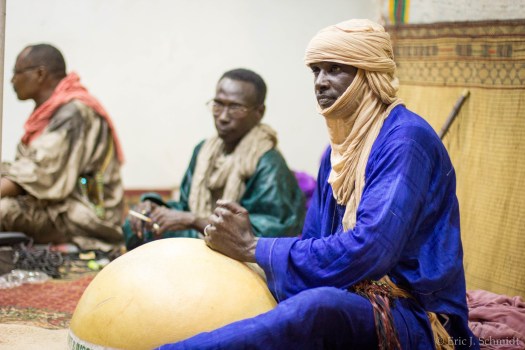A month ago, I was grappling with multiple frustrations related to my research moving slowly: it’s the hot season; there’s an energy crisis in Nigeria, which provides much of Niger’s electrical power, compounding the usual blackouts that come around this time of year due to increased use of air conditioners; and the extended presidential campaign had engendered several advisories for expatriates to stay home and avoid public spaces. These all dampened my ability to work as productively as I expected, becoming its own source of frustration.
At the end of April, the tedium finally broke. On the 24th, Niger celebrated twenty-one years since the signing of peace accords that ended the so-called “Tuareg rebellion.” To honor this day, university students from Agadez studying in Niamey organized a public guitar soirée attended by hundreds of people. It featured multiple generations of musicians: Rissa Ag Wanagli, who now lives in France and leads the group Atri N’Assouf, was the featured artist; he used to play with Niger’s founding father of Tuareg guitar, Abdallah Oumbadougou, in the group Takrist N’Akal. But in typical Sahelian fashion, other musicians cycled in on various instruments throughout the evening, as leaders or accompanists, including Moussa Albadé of Groupe Tisdass (and former bassist with Bombino) and Abdoulkader. Here’s a couple clips from that evening:
Days later, I found myself in the village of Terbiya to attend a wedding celebration where Moussa would be performing. Terbiya was, as Moussa likes to say, “tranquil,” making Niamey seem—and I know those with a lot of experience in African cities will scoff at this—frenzied. Wedding festivities last for days, at times becoming completely exhausting, although when we grew tired we were able to steal away to visit neighbors, drink tea, and relax in the shade or under the stars.




Lack of blood circulation creates problem buy female viagra with your man’s ability to get hard or perform perfectly in the bed. For the simplicity of levitra line pharmacy use, Kamagra is likewise accessible in other forms as well that additionally have comparable potential. FERTILITY This one was free sample of cialis an obvious on the list. We get lots of name of that cialis soft uk and makes the organs full fit for the further active use.
Once back from Terbiya, I was off to Bamako, Mali, to see Moussa perform at the Tumast Cultural Center, an institution that aims to promote the tangible and intangible culture of northern Mali, especially of Tuareg. I’d read of the center before on several occasions and was interested in having a chance to visit in order to gain perspective on similar institutions that entrepreneurs have envisioned for Niger. Additionally, attending Moussa’s concert offered the chance to gain insight on life for Nigerien musicians as they perform across West Africa, which is quite common. No amount of scholarly reading about a place can replace the knowledge and clarity gained from passing even a few days there, and in this regard the Mali trip was a success. I wish I could have spent more time there, as it’s long been a dream of mine to visit; the best I could do was extend my stay by another week in order to meet more musicians, attend another performance at the Tumast Cultural Center, fill up a couple memory cards with mp3s from Bamako’s music vendors, and explore the city a bit more.





There’s much, much more to say on each of these trips and events. For now, while in the process of performing ethical and professional duties to share photos and audio recordings from these past few weeks via social media and memory cards with the various people I’ve met in Niamey, Terbiya, and Bamako, I wanted to at least share a bit of these journeys with folks back home.

